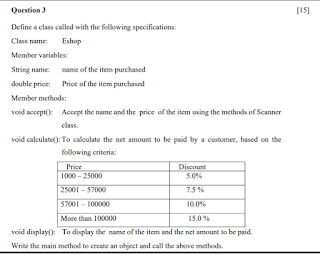Program 1
Write a program in Java to accept a string in lower case and change the first letter of every word to upper case. Display the new string.
Sample input: we are in cyber world
Sample output: We Are In Cyber World
import java.util.Scanner;
class P1{
public static void change(){
Scanner sc = new Scanner(System.in);
System.out.println("Enter a sentence");
String s = sc.nextLine();
String newstr = "";
s = s.toLowerCase();
s = s.trim();
s = " " + s;
for(int i=0; i<s.length(); i++){
char ch = s.charAt(i);
if(ch == ' '){
newstr = newstr + ch;
newstr = newstr + Character.toUpperCase(s.charAt(i+1));
i++;
}
else {
newstr = newstr + ch;
}
}
System.out.println("new string = " + newstr);
}
}
Program 2
Write a program to accept a string. Convert the string into upper case letters. Count and output the number of double letter sequences that exist in the string
sample Input: SHE WAS FEEDING THE LITTLE RABBIT WITH AN APPLE
Sample Output:4
import java.util.Scanner;
class P2{
public static void countDouble(){
Scanner sc = new Scanner(System.in);
System.out.println("Enter a sentence");
String s = sc.nextLine();
int count = 0;
s = s.toUpperCase();
for(int i =0; i<s.length()-1 ; i++){
char ch = s.charAt(i);
char ch1 = s.charAt(i+1);
if(ch == ch1){
count++;
}
}
System.out.println("count of double letter seq = " + count);
}}
Program 3
Special words are those words which start and end with the same letter.
Example: EXISTENCE, COMIC, WINDOW
Palindrome words are those words which read the same from left to right and vice-versa.
Example: MALYALAM, MADAM, LEVEL, ROTATOR, CIVIC
All palindromes are special words but all special words are not palindromes.
Write a program to accept a word. Check and display whether the word is a palindrome or only a special word or none of them.
import java.util.Scanner;
class P3{
public static void check(){
Scanner sc = new Scanner(System.in);
System.out.println("Enter a word");
String w = sc.next();
boolean isSpecial = false;
boolean isPalin = false;
// decide if the word is a special word
char fc = w.charAt(0);
char lc = w.charAt(w.length()-1);
if (fc == lc)
isSpecial = true;
String rev = "";
for(int i = w.length()-1; i >= 0; i--){
rev += w.charAt(i);
}
if(w.equals(rev))
isPalin = true;
if( isSpecial && isPalin )
System.out.println(w + " is special and palindrome ");
else if(isSpecial)
System.out.println(w + " is special");
else if(isPalin)
System.out.println(w + " is palindrome ");
else
System.out.println(w + " is neither special nor palindrome ");
}}




